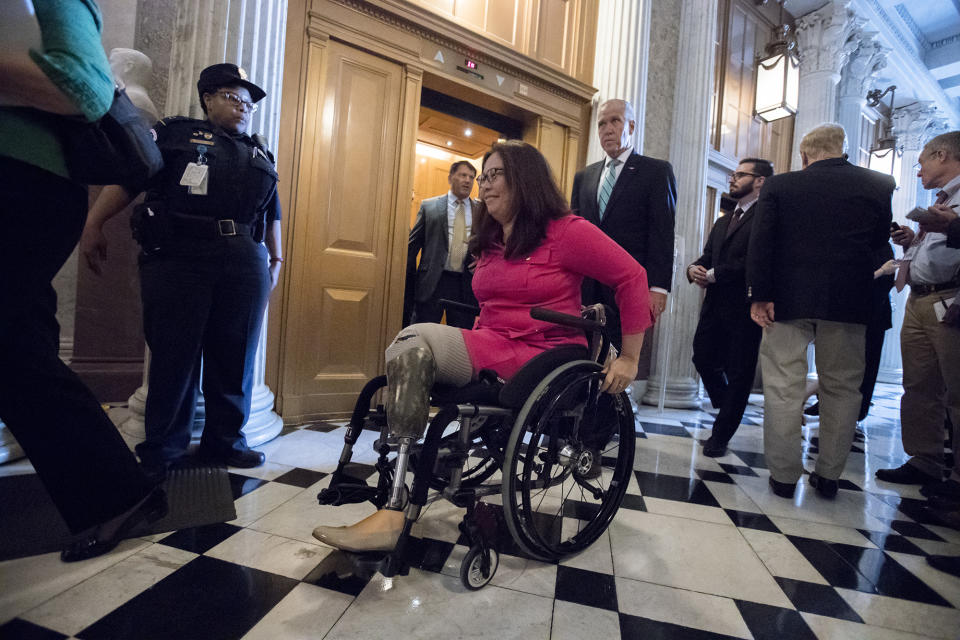Sen. Tammy Duckworth, a vet and double amputee, faces fight for equality as she will become first senator to give birth in office
Just eight months into Tammy Duckworth’s 2004 deployment in Iraq, a rocket-propelled grenade exploded through the Blackhawk helicopter she was flying. As she wrote in a 2015 piece for Politico, “My right leg was vaporized; my left leg was crushed and shredded against the instrument panel.”
That day could have easily been the end of Senator Duckworth’s life, but instead, 14 years later, she is a wife, mother, and a Democratic senator from Illinois. She is 50, a double amputee as a result of the injuries she sustained in the helicopter crash, and this spring, she will give birth to her second child — which will make her the first U.S. senator to give birth while in office.

While the lawmaker is noteworthy for many reasons, it is Duckworth’s pregnancy that has resulted in her most widespread attention yet. Since a senator giving birth while in office is something the (historically male) Senate has been grossly unprepared for, Sen. Duckworth is now fighting to change the rules to make more room for working moms — and to ensure a smoother road for more female senators to come.
Yahoo Lifestyle: Congratulations on your pregnancy. Did you ever imagine that it would garner this kind of attention?
Sen. Tammy Duckworth: Absolutely not. I still can’t believe that it’s getting this kind of attention. I really thought that this was going to be like, you make the announcement and just move on. But I announced after the government shutdown, and I think people were looking for some happy news. It was very bipartisan, the positiveness with which my announcement was received.
Thank you for the outpouring of congratulations and support. I’m hardly alone or unique as a working parent, and my daughter Abigail has only made me more committed to doing my job and standing up for hardworking families everywhere
— Tammy Duckworth (@SenDuckworth) January 24, 2018
What has this journey taught you about what needs to change for the average American woman regarding maternity leave or family leave policies?
Well, that we are the last industrialized nation that doesn’t have family leave policies, and that is a problem. How are we to be leaders of the free world, and leaders in democracy, if we don’t have something as simple as national legislation to help our citizens take care of their families? Frankly, I think it’s very shortsighted when it comes to the economic impact, because it hurts our country to not have universal family leave.
If changes aren’t made, what are some potential repercussions?
I think we’re already seeing them. I think you see that we lose in terms of competitiveness. If you were a young person and you have the opportunity in this globalized world to work anywhere, why would you choose to work in the United States versus in Britain or Norway or Scandinavia, when they are so much more family-friendly? How do we attract the best talent if we’re not competitive with the workplace environment? I think that we’re losing out on the talent that would make our economy strong.
So how much maternity leave do you get as a senator?
Technically none. The way it works in the House and the Senate is that every member runs their own office. The leave staff members get depends on the policy of each office, so they’re all different. I offer 12 weeks of paid family leave to men or women to take care of family, or for the birth, adoption, or fostering of a child. So they can take that time off to take care of a sick family member, or for the birth, adoption, or fostering of a child … and that’s paid 12 weeks. So technically, I would be able to do that as a member of this office, except that Senate rules, which are fairly antiquated, basically say that if a senator takes leave for any reason, they are not allowed to vote. So I will be taking time off … to be with my [newborn] daughter, but I will be coming in to vote during that time period. I want to sponsor legislation; I need to represent the people of Illinois. So I will take time off, but I won’t technically go on leave because if I were to go on leave I would forfeit my ability to represent my state.

So does that mean if there’s an important vote, you will come in?
Yes. It actually has affected my decision of where to deliver my baby. When I was in the House and had my first child, my daughter, I was able to go back to Illinois [to give birth] … and I stayed in Illinois for the 12 weeks. This time there’s only a 51-49 split in the Senate, and every vote counts, so I chose to deliver my child here in D.C., and I will be staying in D.C. in order to be able to come in to vote.
One of the things I’m working on now — and I’m very grateful to the Democratic leadership for backing me up — is seeking the ability to bring my newborn daughter onto the floor of the Senate when I vote, because children are not allowed on the floor.
A post shared by Senator Tammy Duckworth (@senduckworth) on Jan 30, 2017 at 12:10pm PST
What are the most important health and safety issues facing the people of Illinois in 2018?
Access to health care, affordable health care. We do have people who are uninsured. We have people who, even though they have the Affordable Care Act, are in marketplaces where there are fewer and fewer insurers, so their premiums are going up. There are people still who have no access whatsoever. I really do believe that access to health care is a right, and we still have people all across this country and in Illinois who don’t have access to just the fundamental services via health care. Many of those are children, which is not acceptable in a nation like ours.
We have communities in Illinois right now where, if the local hospital goes out of business, there’s no health care in a multicounty area. We have parts of the state where there’s only one place where you can go get your prosthetics made. We just have to do a better job of that, and I think the citizens of our nation need to speak up and say “I support everyone having access to health care.” I’m not talking about people being given free health care or anything like that; I’m just saying that there should be a level of health care that everyone can access, so if you’re sick you can go to the doctor and get some medicine, if you’re a child [you should] be able to go see the dentist — all of these basic things that are fundamental to the human condition.
The proposed ADA Education and Reform Act, if passed, would limit the protections provided by the Americans With Disabilities Act. As someone who uses a wheelchair, what does the bill mean to you personally, and what do you wish more people understood about it?
What it means is a rollback of my civil rights. It is a way for companies, for businesses — 27 years after the passage of the ADA — to continue to not comply with the ADA. What it says is if I in my wheelchair want to get into a restaurant, and there are steps in front of that restaurant, it is my responsibility to then tell the restaurant that I can’t get in, [endure a] waiting period of anywhere from 90 to 120 days, and then go back and ask the restaurant to please let me in. And they can choose not to, and then I don’t have access to that restaurant.
Or they can say, “Well, you know what, if you come by the back door, then we can bring out a box of food for you,” and you just eat out the back door of the restaurant. We had a situation like that, and that was gotten rid of during the civil rights movement when they used to tell persons of color to go to the back door. We would never stand for that to happen to communities of color; why would we stand to let that happen to the disability community?
If you don’t live with a disability, you might not think of #ADA violations as significant at 1st glance, but I assure you they’re significant for those of us who do live with disabilities
— Tammy Duckworth (@SenDuckworth) February 15, 2018
Frankly, the ADA has very reasonable exceptions where, if you are in, for example, a historic building, and the cost of modifying that building to be accessible is excessive, then you’re exempt from ADA compliance for that building. But what’s happening is you have a lot of places that have been built since the ADA that simply never bothered to comply with the ADA and still don’t want to. And they want to take the civil liberties of people with disabilities in order to avoid — and they’re not even denying that they’re looking to do this — to avoid the ADA. They’re admitting that they don’t want to comply with the ADA, they just don’t want to be liable for their decision not to comply.
Sen. Duckworth, let’s now fast-forward 40 years: You’re a woman of 90, reflecting on your time in office. What do you want your legacy to be?
I hope that I make the life of my fellow citizens a little bit better. For me, it’s not about 40 years from now looking back on my legacy, for me it’s about every day that I’m alive on this earth is a day that is a gift that was given to me by my buddies in my helicopter crew who carried me to safety when I was hit.
I really should have died in that field in Iraq; there’s no real reason that I survived other than some really good men risked their lives to save me. So for me, it’s about every day since then I wake up living a life and being worthy of what they did to save me. I don’t ever want those guys to say that they regret what they did to save my life because I turned out to be such an idiot. I want them to say. “Oh, thank God.” They risked their lives, and what they went through to save me is worse than anything Hollywood could ever come up with. And I owe them.
Read more from Yahoo Lifestyle:
• In Trump’s America, should you bring up politics on the first date?
• New Stormy Daniels claim raises dark questions
• What happens when your body attacks itself?
Follow us on Instagram, Facebook, and Twitter for nonstop inspiration delivered fresh to your feed, every day.


